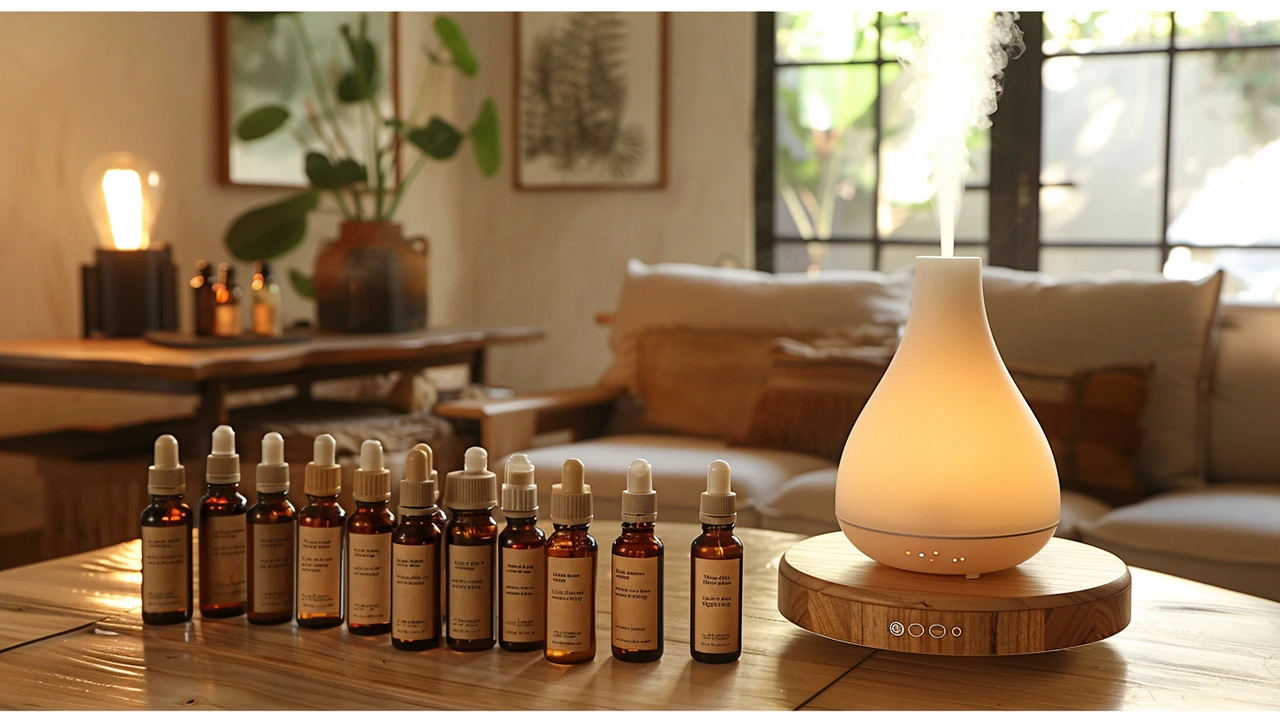Aromatherapy, the practice of using essential oils for therapeutic benefits, has been making waves in the health and wellness circles. While it might seem like a recent trend, this method has roots deeply embedded in ancient civilizations. For many people, the appeal lies in its natural approach to emotional healing and mental well-being.
Through the careful use of aromatic plant extracts, aromatherapy can influence mood, reduce stress, and even alleviate symptoms of anxiety and depression. Whether through inhalation or topical application, essential oils can offer a comforting and holistic remedy for emotional distress.
- Introduction to Aromatherapy
- How Aromatherapy Works
- Benefits of Different Essential Oils
- Choosing the Right Essential Oils
- Methods to Use Essential Oils
- Incorporating Aromatherapy into Daily Life
Introduction to Aromatherapy
Aromatherapy has been part of human culture for thousands of years, dating back to ancient civilizations like Egypt, China, and India. These cultures used aromatic plants in religious rituals, cosmetics, and medicine. This practice involves using natural plant extracts, specifically essential oils, to improve both physical and emotional well-being.
The term 'aromatherapy' was first coined by French chemist René-Maurice Gattefossé in 1937 after he discovered the healing properties of lavender oil quite by accident. Aromatherapy's primary mechanism is the inhalation of essential oils, which stimulates the olfactory system – the part of the brain connected to smell, including the limbic system, which controls emotions and memory.
How Essential Oils Are Made
Essential oils are typically extracted from various parts of plants including leaves, flowers, bark, stems, and roots. This process often involves methods like steam distillation or cold pressing. The result is a concentrated liquid carrying the essence of the plant's fragrance and its therapeutic properties. These oils contain active compounds like terpenes and esters, which have distinct effects on the human body and mind.
For example, lavender is widely known for its calming properties, while eucalyptus can help clear the sinuses and provide mental clarity. Beyond these specific benefits, essential oils can work synergistically when blended, creating a more potent and holistic effect on mental and emotional health.
Aromatherapy offers numerous applications, from simple home diffusers to elaborate spa treatments. The versatility of essential oils opens up a myriad of possibilities for usage, including massage oils, bath salts, and even household cleaning products. Each method has its unique way of delivering the therapeutic benefits of the oils to the user.
"The sense of smell is a powerful link to emotion and memory, making aromatherapy a subtle yet profound way to ease emotional distress." - International Journal of Aromatherapy
Scientific studies are increasingly backing up what many have known anecdotally for years. Research has shown that specific essential oils can significantly reduce symptoms of anxiety, improve sleep quality, and even enhance cognitive performance. Aromatherapy is not just a luxurious addition to a wellness routine; it can be an effective and science-backed method for emotional healing.
This ancient art is gaining renewed interest in modern times, primarily due to its natural approach to healthcare and the rising demand for holistic treatment options. With an increasing body of evidence supporting its efficacy, aromatherapy has firmly positioned itself as a highly beneficial tool for not only physical health but emotional well-being as well.
How Aromatherapy Works
Aromatherapy taps into the power of our senses. The sense of smell is particularly potent because it connects directly to the brain's limbic system. This is the part of the brain responsible for emotions, memories, and arousal. When you inhale the aroma of essential oils, the molecules stimulate olfactory receptors, which then send signals to the brain. This process can immediately impact mood and emotional states.
One of the key components in this process is the use of essential oils. These oils are concentrated plant extracts that capture the natural aromatic compounds of the plant. A well-known example is lavender oil, which is often used to induce relaxation and reduce stress. Research shows that the scent of lavender can trigger the release of neurotransmitters like serotonin and dopamine, which are often referred to as 'happy chemicals.'
The skin's ability to absorb essential oils also plays a crucial role. When essential oils are applied topically, they penetrate the skin, enter the bloodstream, and can affect various bodily systems. Some oils, like eucalyptus, are known for their anti-inflammatory properties, while others like peppermint can act as natural pain relievers. Combining inhalation and topical application maximizes the benefits, providing a holistic approach to emotional healing.
Scientific studies have supported these claims. For example, a study published in the Journal of Alternative and Complementary Medicine found that participants who inhaled sweet orange essential oil reported significantly less anxiety and improved mood. Such findings align with holistic healing advocates' long-held beliefs that scents can provide psychological benefits.
Notably, the methods of use in aromatherapy are diverse. Direct inhalation from a bottle, diffusing oils into the air, or adding them to a warm bath are common methods. Each approach offers different benefits. While inhalation provides immediate effects on the brain, topical application ensures that the oils have a more prolonged and systemic impact on the body's systems.
"The sense of smell is primitive, direct, and potently linked to our deepest emotional responses," notes Dr. Rita Bauer from the Institute of Olfactory Research.
Understanding these mechanisms underscores why many people turn to aromatherapy not just for physical ailments, but for mental and emotional support as well. Knowing how and why scents affect us can guide better, more effective use of essential oils. Whether you are seeking to reduce stress, alleviate anxiety, or simply find a moment of calm, aromatherapy provides a pleasant and natural option worth exploring.
Benefits of Different Essential Oils
Essential oils, extracted from various plants, have unique properties that can provide emotional benefits. For example, lavender oil is renowned for its calming and relaxing properties. People often use it to alleviate symptoms of anxiety and improve sleep quality. Studies have shown that inhaling lavender oil can reduce stress hormones and create a sense of relaxation.
Another popular choice is peppermint oil, known for its invigorating effects. It can boost energy levels, enhance mental clarity, and alleviate feelings of fatigue. This oil is often referred to as a natural stimulant, making it an excellent choice for those who need a pick-me-up during the day.
Bergamot oil is another essential oil with a fascinating profile. It's known for its mood-enhancing and anxiety-reducing properties. A study published in the journal 'Phytotherapy Research' highlighted its effectiveness in reducing symptoms of depression.
"Bergamot essential oil can significantly reduce stress and anxiety levels, making it a valuable tool in emotional healing," according to Dr. Alan Hirsch, a renowned neurologist and psychiatrist.
For those struggling with feelings of sadness, lemon oil may be beneficial. The uplifting and refreshing scent can boost mood and energy levels. It's often used in aromatherapy to combat symptoms of depression and promote a positive outlook.
Chamomile oil, known for its soothing properties, is another essential oil that can help with emotional healing. It can reduce feelings of anxiety, promote relaxation, and improve sleep quality. This oil is especially helpful for those who experience restlessness and irritability.
The benefits of essential oils extend beyond emotional healing. For instance, eucalyptus oil is often used to relieve mental exhaustion and restore vitality. Its refreshing aroma can clear the mind and improve focus, making it a popular choice for individuals who need mental clarity.
In summary, different essential oils offer various benefits that can support emotional well-being. By understanding their properties, one can choose the right oil to address specific emotional needs. Aromatherapy provides a natural and holistic approach to emotional healing, making it an increasingly popular choice for those seeking alternative therapies.
Choosing the Right Essential Oils
Finding the perfect essential oils for emotional healing can feel like finding a needle in a haystack, but it's simpler than it seems. With dozens of options, each with unique therapeutic properties, it's crucial to understand what each oil can offer. Essential oils are derived from various parts of plants, including flowers, leaves, and roots, and each type contains specific compounds that impact our mental and emotional states differently.
For instance, lavender oil is renowned for its calming effects. It has been shown to reduce anxiety and improve sleep quality, making it a popular choice for those dealing with stress or insomnia. Studies have revealed that inhaling the scent of lavender can lower cortisol levels, which is the body's primary stress hormone. Similarly, peppermint oil is another powerhouse, known for boosting energy and enhancing mental clarity. It can be particularly useful during the day when fatigue sets in, offering a natural lift without the need for caffeine.
Another favorite is ylang-ylang oil, which is prized for its mood-lifting properties. It has been used traditionally to alleviate symptoms of depression and induce a feeling of happiness. Aromatherapy involving ylang-ylang has been reported to reduce blood pressure, making it a good choice for those who experience anxiety-induced physical symptoms.
According to a study published in the Journal of Positive Psychology, ylang-ylang essential oil can significantly improve feelings of relaxation and reduce negative emotions.
Chamomile oil, often associated with soothing teas, carries similar calming effects when used in aromatherapy. This oil is excellent for reducing irritability and promoting a state of calm, which can be particularly beneficial for children and adults experiencing restlessness or hyperactivity. Bergamot oil is another essential oil worth noting, especially for its anti-depressant qualities. The citrusy aroma of bergamot can elevate mood and create a sense of relaxation. An intriguing aspect of bergamot oil is its ability to balance emotions, providing both uplifting and calming effects depending on what the body needs.
When you're starting, it might be helpful to experiment with blends. Many aromatherapists recommend blending oils to enhance their benefits. For example, a mix of lavender, bergamot, and ylang-ylang can create a powerful concoction for reducing anxiety and promoting a serene state of mind. There are no hard and fast rules, so feel free to create personalized blends that address your specific emotional needs.
Storing your oils correctly is essential to preserving their potency. Keep them in dark glass bottles away from direct sunlight and heat. It's also vital to note that some essential oils can cause skin irritation if applied directly without a carrier oil, such as jojoba or coconut oil. Make sure to do a patch test before extended use.
Methods to Use Essential Oils
When it comes to using essential oils, there are several effective methods to choose from, depending on your preference and needs. One of the most common ways is through inhalation, which can be done using a diffuser. This process releases the oil particles into the air, filling your space with their aroma. Breathing these in can have immediate effects on your mood and emotional state.
Another popular method is topical application. This involves applying the diluted essential oil directly to the skin. Common areas include the wrists, behind the ears, and the bottoms of the feet. This method allows the oils to be absorbed into the bloodstream, offering prolonged benefits. It’s important to mix the essential oil with a carrier oil, such as coconut or jojoba oil, to prevent skin irritation.
For those who like a more personal touch, massage therapy with essential oils can be incredibly soothing. This method combines the benefits of both topical application and physical touch. Aromatherapy massages are a wonderful way to reduce stress and anxiety, leaving you feeling relaxed and rejuvenated. A professional therapist usually customizes the blend of oils to suit your emotional needs.
A bath soak with essential oils is another delightful way to reap their benefits. Adding a few drops of your favorite oil to a warm bath can create a spa-like experience at home. It’s a simple and effective method to unwind after a long day. Citrus oils like bergamot or sweet orange are particularly uplifting, while lavender or chamomile can help you relax before bedtime.
Some people prefer to create their own personal inhalers. These are small, portable devices that allow you to inhale the aroma whenever you need a quick pick-me-up. They are especially useful for those who travel frequently or have high-stress jobs. A mix of peppermint and eucalyptus, for instance, can be invigorating and help clear the mind.
Another interesting method is steam inhalation, which is excellent for respiratory support. Simply add a few drops of essential oil to a bowl of hot water, place a towel over your head, and breathe deeply. This technique not only improves your mood but can also relieve congestion and improve respiratory functions.
According to the National Association for Holistic Aromatherapy (NAHA), "Aromatherapy uses essential oils to improve the health of the body, mind, and spirit. It enhances both physical and emotional health."
Lastly, essential oils can be incorporated into your daily routines through products like scented candles, lotions, or room sprays. Doing so keeps the atmosphere in your living space consistently pleasant, reinforcing the emotional benefits of the oils throughout your day. This method works subtly but effectively, and can easily become a cherished part of your self-care routine.
Incorporating Aromatherapy into Daily Life
Incorporating aromatherapy into your daily routine can be a wonderful way to enhance your mental well-being and emotional health. One of the easiest ways to start is by using a diffuser. These devices disperse the particles of essential oils into the air, allowing you to inhale their therapeutic properties. For instance, diffusing lavender oil in the evening can promote relaxation and better sleep.
Another simple method is to add essential oils to your bath. Imagine soaking in warm water infused with a few drops of chamomile or eucalyptus oil. Not only does it help in relieving stress, but it also provides a rejuvenating experience for the mind and body. For those who enjoy a daily skincare routine, adding a couple of drops of essential oil to your favorite lotion or moisturizer can bring both beauty and balance.
For a boost during your busy day, consider making your own aromatherapy inhaler. It's easy to carry around and offers quick relief from stress and anxiety. Simply add a few drops of your preferred essential oil onto a cotton wick and place it inside a small, sealable container. Then, open the container and inhale deeply whenever you need a quick pick-me-up. This can particularly be helpful during stressful workdays or while traveling.
Cooking with essential oils is another delightful way to incorporate these potent extracts into your daily life. Just be sure to use edible-grade oils and adhere to appropriate dosage guidelines. A drop of peppermint or lemon oil can add a zesty flavor to your dishes and provide the added benefit of digestive aid. These oils can be a wonderful addition to your culinary experiments, enhancing both flavor and wellness.
Creating a Calming Environment at Home
Transforming your living space into a sanctuary of calm can have a remarkable impact on your emotional well-being. Aromatherapy can play a crucial role in this transformation. Start by creating an inviting atmosphere in your living room or bedroom by using essential oil blends designed for relaxation. A mix of lavender, bergamot, and ylang-ylang can fill your home with a sense of peace and tranquility.
"Aromatherapy is an extremely effective way of creating a sense of peace during a hectic day. Using essential oils can help people bring balance into their chaotic lives." - Dr. Jane Buckle, PhD, RN, author of 'Clinical Aromatherapy'
Even your cleaning routine can benefit from incorporating essential oils. Adding a few drops of tea tree or lemon oil to your cleaning supplies can naturally disinfect surfaces and leave a pleasant aroma throughout your home. The uplifting scents make the mundane chore of cleaning feel like a refreshing ritual.
Finally, consider starting your day with a positive affirmation ritual combined with aromatherapy. Light a candle infused with essential oils or use a diffuser as you practice your affirmations or meditate. This practice sets a positive tone for the day and helps reinforce inner peace and emotional resilience by enveloping yourself in a nurturing scent.





